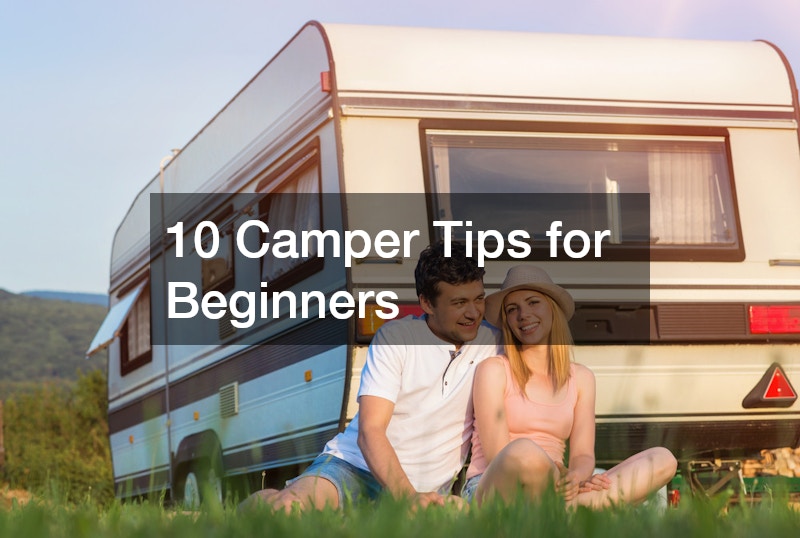
Camping is an exciting adventure that allows you to connect with nature, explore new environments, and take a break from the stresses of daily life. For beginners, however, the world of camping can seem overwhelming. From choosing the right gear to navigating a campsite, there are a lot of details to consider. Whether you’re renting an RV for your first trip or planning to camp in a tent, it’s essential to approach the experience with the right mindset and preparation. With these camping tips for beginners, you’ll feel more confident and prepared for your outdoor adventure. In this blog, we’ll guide you through the most important tips for beginners, starting with how to prepare for your first camping trip and what gear you’ll need to make the experience enjoyable.
Preparing Your Camper for the First Trip
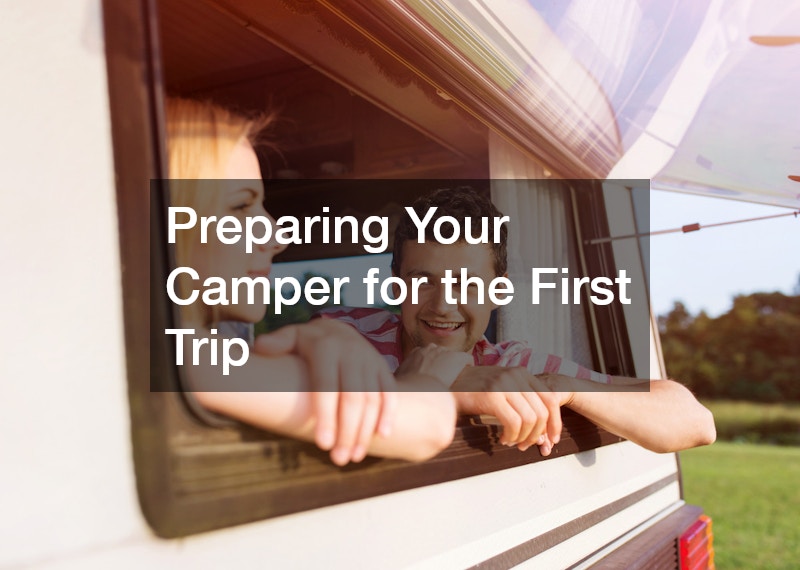
One of the first steps in becoming a successful camper is ensuring that your vehicle, especially if you’re using an RV, is properly prepared for the trip. If you’re new to RV camping, it’s important to take some time to familiarize yourself with the features and mechanics of your RV. Basic maintenance like checking tire pressure, ensuring your water systems are functional, and inspecting your power sources can save you from trouble down the road. Also, organizing your camper so that everything is easily accessible while on the road will make your trip much smoother.
For beginners, it’s also a good idea to explore RVs for sale before you set out, as owning a camper can provide more flexibility and comfort during your travels. Check for features that are suited to your specific camping needs, such as storage space, power outlets, and easy-to-use kitchen facilities. Knowing the layout of your RV before you head out will help you avoid last-minute surprises and allow you to enjoy your trip without worrying about basic logistics. Additionally, practicing driving and parking your RV beforehand is a crucial step to ensure safety on the road.
Essential Gear for Beginner Campers
When embarking on your first camping trip, having the right gear is essential for both comfort and safety. Camping tips for beginners often emphasize the importance of packing items that will support your needs during your stay outdoors. If you’re unsure where to start, looking at car camping essentials can help you understand which items truly matter. Essential gear includes tents, sleeping bags, a portable stove, and coolers for food storage. However, many campers forget the smaller items that can make a big difference in their overall experience, such as pumps for inflating air mattresses or other inflatable gear. A reliable pump is crucial for ensuring a comfortable sleep, especially if you’re camping in areas without access to comfortable bedding.
For beginners, it’s helpful to look for pumps that are easy to use and versatile. Whether you opt for a manual or electric pump, choose one that fits the gear you’re bringing, such as air mattresses or inflatable kayaks. Having a dependable pump can save you time and frustration when setting up camp. It’s also wise to bring extra batteries or a car charger if you’re using an electric pump, as outdoor trips can sometimes result in unexpected situations where power may be limited. Be sure to check out recommendations from experienced campers about which pumps work best for your specific needs.
Understanding Campsite Etiquette
When you’re camping for the first time, it’s important to understand the basic rules of campsite etiquette. This involves respecting the environment, fellow campers, and the local wildlife. Following these unwritten rules ensures that everyone enjoys their camping experience without disruptions. Whether it’s keeping noise to a minimum, cleaning up after yourself, or following the fire safety guidelines, understanding the dos and don’ts of camping can make a big difference in the overall atmosphere of your trip.
For beginners, understanding business principles like respecting others and maintaining a professional attitude can apply to the campsite too. Treat the space as if it were a shared business environment—be punctual when arriving and leaving, keep your area clean, and respect other campers’ privacy. Also, be mindful of the business hours for campground facilities, such as showers or check-in times, to ensure you’re adhering to the camp’s operational structure. By doing so, you not only ensure a smooth camping experience for yourself but also contribute positively to the campsite community.
Navigating Different Campsite Types
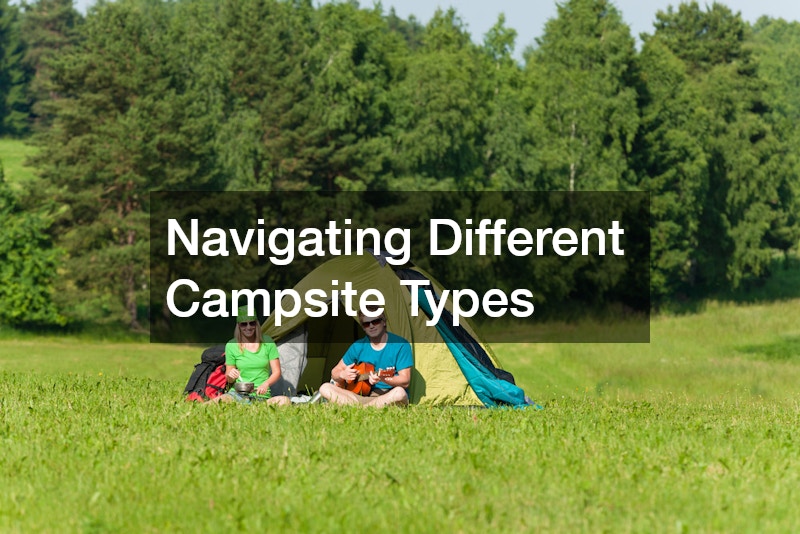
A crucial skill for any camper is learning how to navigate different types of campsites. Whether you’re choosing a developed campsite with amenities or a more rustic, backcountry site, each type offers its own set of challenges and advantages. Developed campsites typically have established roads, utilities, and other amenities, making them ideal for beginners. However, backcountry sites might offer a more immersive experience but require more advanced preparation and knowledge of terrain and weather conditions.
For beginners, understanding the need for shelter is key when deciding where to camp. Shelters can range from basic tents to more complex setups like hammocks with covers or tarps. If you’re camping at a backcountry site, ensure you know how to set up a shelter that will protect you from the elements. It’s important to research the weather conditions of your chosen campsite to make sure you’re properly equipped with the right shelter to stay warm and dry, especially in more remote locations.
Packing Efficiently for Your Camper
One of the key tips for beginner campers is learning how to pack efficiently. For an enjoyable camping experience, you’ll need to bring everything from food to sleeping gear, but it’s essential to do so without overpacking. The right balance of gear and supplies is necessary to maximize comfort and space within your camper. Begin by making a list of essentials and categorizing your items, from cooking supplies to bedding, and consider multi-purpose items to save space. Using a simple car camping checklist can make this process easier and ensure you don’t overlook important gear, helping you stay organized from start to finish.
When it comes to finding affordable gear, thrift shops can be an excellent resource. You don’t have to break the bank when outfitting your camper for your first trip. Thrift shops often carry lightly used camping gear such as sleeping bags, camping stoves, and even tents. Purchasing secondhand items is not only cost-effective but also environmentally friendly. For beginners, shopping at thrift stores offers a chance to test out camping gear without committing to expensive new equipment. Just make sure to check the quality of the items before buying to ensure they will hold up during your trip.
Setting Up Camp
Setting up camp can be an exciting yet daunting task, especially for beginners. Whether you’re pitching a tent, setting up an RV, or organizing a cooking area, it’s important to make sure everything is in its proper place. Clear organization will help you maximize your space and make the most of your camping experience. A good campsite setup can also contribute to your comfort and safety during your stay.
One helpful tool that might be overlooked when setting up camp is custom signage. This can be used to designate personal areas, indicate the location of camp supplies, or even provide clear labeling for specific gear, such as food storage or waste disposal. For example, a custom sign for your cooking area can help keep the camp organized and ensure that items are not misplaced. Custom signage can be especially helpful if you’re camping with a group, as it provides clear communication and makes the campsite more organized.
Cooking Tips for Camper-Friendly Meals
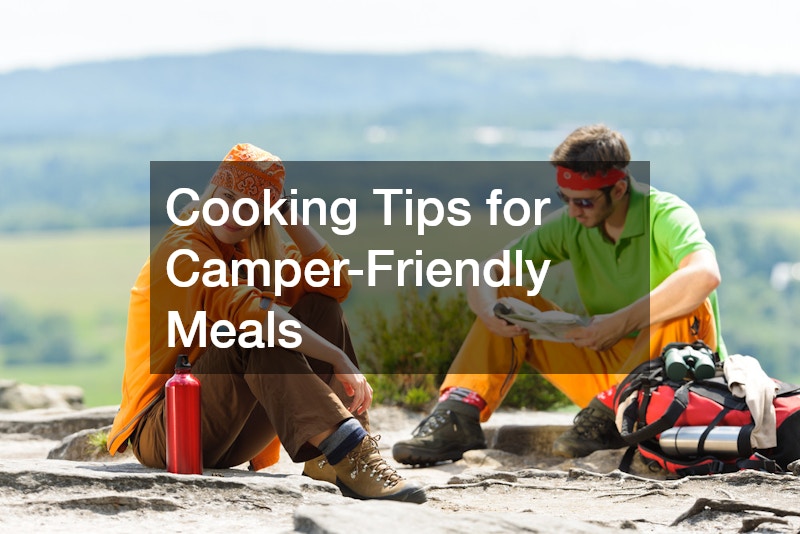
One of the highlights of camping is enjoying delicious meals in the great outdoors. Cooking while camping may seem intimidating for beginners, but with the right approach and equipment, you can prepare satisfying meals without hassle. Cooking outdoors doesn’t have to be complicated; it’s all about planning ahead, using simple ingredients, and having the right tools. Whether you’re grilling over an open flame or using a portable stove, a little preparation can ensure that meal times are stress-free.
For beginners, hiring a catering service for your first camping trip can be a great way to get a feel for cooking in the outdoors without the added pressure of meal prep. Many catering companies offer packages designed specifically for campers, including pre-prepared meals, snacks, and easy-to-cook dishes. This service can save you time and energy, allowing you to focus on enjoying your camping experience. However, if you prefer to cook on your own, take advantage of meal prep services that provide camping-friendly meals ready to cook or heat up.
Safety Considerations for New Campers
Safety is one of the most important aspects of camping, especially for beginners who may not be familiar with the potential hazards of outdoor environments. From ensuring your shelter is secure to being aware of the wildlife around you, safety measures should always be a top priority. Basic safety knowledge, such as proper food storage and fire safety, is essential for preventing accidents while camping.
Another often-overlooked safety concern is tree maintenance. Before setting up camp, it’s crucial to inspect the area for overhanging branches or dead trees that could pose a danger during storms or high winds. Trees near your campsite should be checked for stability, as fallen branches can cause injury or damage to your gear. If you’re camping in a forested area, consider choosing a location away from trees that could fall during severe weather. This simple step in tree maintenance will significantly reduce the risk of accidents and ensure that your camping experience is as safe as possible.
Choosing the Right Campsite Location
Choosing the right campsite location is crucial for a successful camping experience. Your location will affect everything from comfort to safety. For beginners, it’s essential to find a site that suits your skill level and provides the amenities or wilderness experience you’re looking for. Whether you’re camping in an established campground or venturing into the backcountry, it’s important to consider factors like accessibility, proximity to water sources, and environmental conditions.
When setting up your camp, consider using a strainer to filter any water you collect from lakes or streams, especially if you plan to drink it. A strainer is an essential tool for camping in natural settings, as it helps remove debris and other impurities from water before it’s used for cooking or drinking. Ensuring that the water you use is clean will prevent health risks and make your camping experience more comfortable. Whether you’re setting up by a lake or river, always use a strainer to guarantee safe and clean water consumption during your trip.
Managing Waste and Clean-Up While Camping
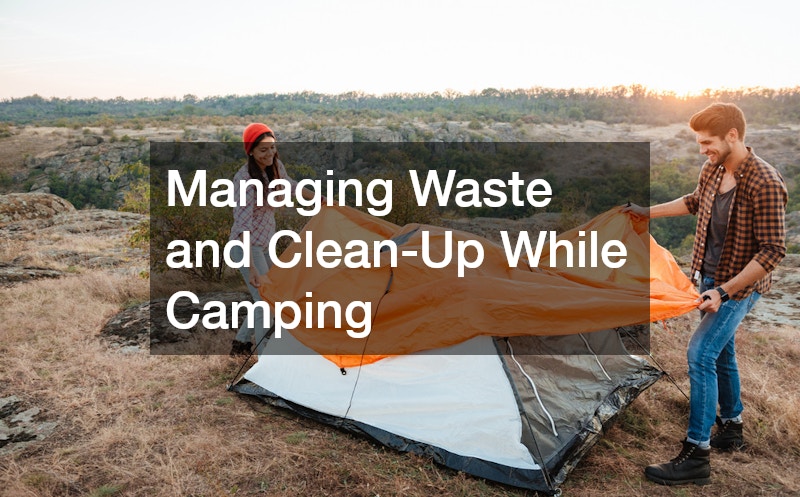
Proper waste management and clean-up are key components of a responsible camping experience. It’s important to leave no trace and minimize your environmental impact, especially as a beginner. Always pack out what you bring in, and dispose of trash in designated waste bins or take it with you when leaving. Proper waste management not only helps keep the campsite clean but also protects wildlife and the environment.
For beginners, learning about pre K waste protocols, such as using waste disposal bags or portable toilets when necessary, is a great place to start. Young campers or beginners may not realize the importance of maintaining cleanliness around the campsite. Setting a good example for children or those new to camping can help instill the value of cleanliness and environmental stewardship. Proper waste management and teaching others to respect the outdoors ensures that everyone can enjoy nature without leaving a negative impact.
Camping is a rewarding activity that allows you to reconnect with nature and create lasting memories. For beginners, the experience can be intimidating, but with the right preparation and knowledge, it can be incredibly fulfilling. By following the camper tips for beginners outlined in this guide, you’ll be well on your way to mastering the art of camping. From selecting the perfect campsite to ensuring your gear is prepared and managing waste responsibly, each step you take will contribute to a more enjoyable and stress-free outdoor adventure. Keep these tips in mind, and you’ll soon find that camping is an activity you can truly enjoy year-round. Happy camping!
